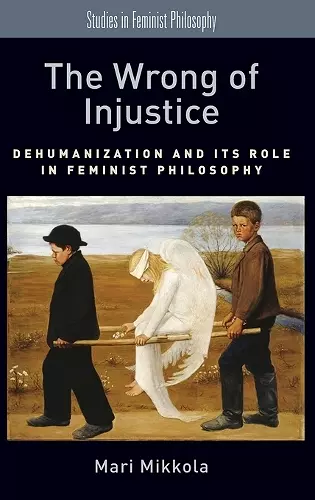The Wrong of Injustice
Dehumanization and its Role in Feminist Philosophy
Format:Hardback
Publisher:Oxford University Press Inc
Published:4th Aug '16
Currently unavailable, and unfortunately no date known when it will be back
This hardback is available in another edition too:
- Paperback£44.99(9780190601089)

This book examines contemporary structural social injustices from a feminist perspective. It asks: what makes oppression, discrimination, and domination wrongful? Is there a single wrongness-making feature of various social injustices that are due to social kind membership? Why is sexist oppression of women wrongful? What does the wrongfulness of patriarchal damage done to women consist in? In thinking about what normatively grounds social injustice, the book puts forward two related views. First, it argues for a paradigm shift in focus away from feminist philosophy that is organized around the gender concept woman, and towards feminist philosophy that is humanist. This is against the following theoretical backdrop: Politically effective feminism requires ways to elucidate how and why patriarchy damages women, and to articulate and defend feminism's critical claims. In order to meet these normative demands an influential theoretical outlook has emerged: for emancipatory purposes feminist philosophers should articulate a thick conception of the gender concept woman around which feminist philosophical work is organized. However, Part I of the book argues that we should resist this move, and that feminist philosophers should reframe their analyses of injustice in humanist terms. Second, the book spells out a humanist alternative to the more prevalent gender-focus in feminist philosophy. This hinges on a notion of dehumanization, which Part II of the book develops. The argued for understanding of dehumanization is used to explicate the wrongness-making feature of social injustices, both in general and of those due to patriarchy. Dehumanization is not another form of injustice-rather, it is that which makes forms of social injustice unjust. The book's second part then provides a regimentation of social injustice from a feminist perspective in order to spell out the specifics of the proposed humanist feminism, and to demonstrate how it improves some non-feminist analyses of injustice too.
Taken as a whole, the monograph is an outstanding contribution to feminist philosophical scholarship, and one that I anticipate will alter the course of a number of discussions in this field in fruitful ways. * Katharine Jenkins, University of Nottingham, Mind *
Mari Mikkola's The Wrong of Injustice is a tour de force that combines a critique of recent philosophical debates about the notion of gender with an argument that feminist philosophy should adopt a "humanist" normative position rather than a specifically feminist one. ... The book is an important and ambitious contribution to feminist philosophy and deserves to be studied by both specialists and students. It would be ideal for an advanced undergraduate or graduate seminar owing to its careful exposition and critique of many of the main themes within contemporary feminist philosophy. ... Mikkola's book displays an impressive breadth of research and a multitude of dense, detailed arguments. ... It displays a mastery of diverse philosophical literatures from feminist metaphysics to the (not necessarily feminist) social philosophy of discrimination, domination, and oppression. * Natalie Stoljar, Ethics *
The Wrong of Injustice is an impressively thorough, clearly written, and very carefully argued book. The author's erudition is nowhere more evident than in her careful sifting through and critical analysis of the feminist philosophical literature in the first five chapters. * David Livingstone Smith, Hypatia Reviews Online *
Mikkola's book The Wrong of Injustice undertakes a bold paradigm shift in feminist philosophy. She has provided oodles of arguments to support it; but also, as in any paradigm shift, the real power of the work comes from clearing space for new and enlightening ways of thinking. There are many of us looking for non-ideal theory--not just non-ideal commitments--to guide the normative dimension of our work. Mikkola's book provides a model, in fact, a landmark, to guide us as we move ahead. * Sally Haslanger, Massachusetts Institute of Technology *
Mikkola's book is a powerful and original argument for neo-humanist feminism. * Charlotte Witt, University of New Hampshire *
ISBN: 9780190601072
Dimensions: 163mm x 236mm x 25mm
Weight: 624g
298 pages